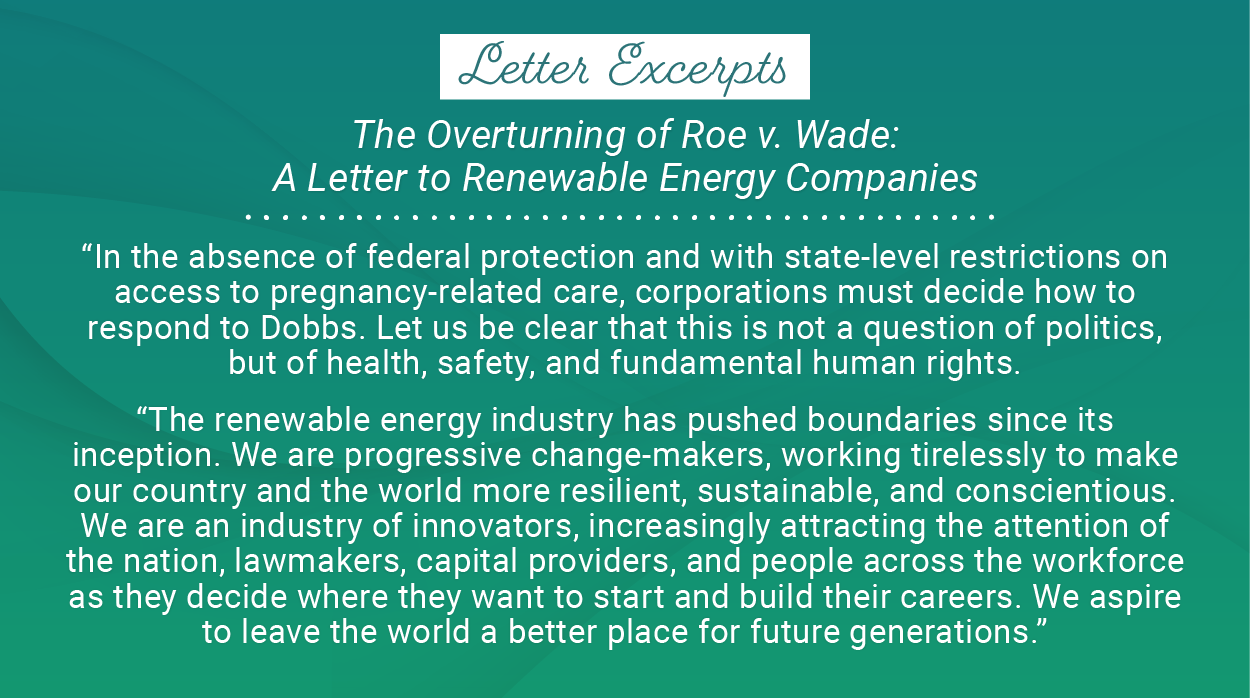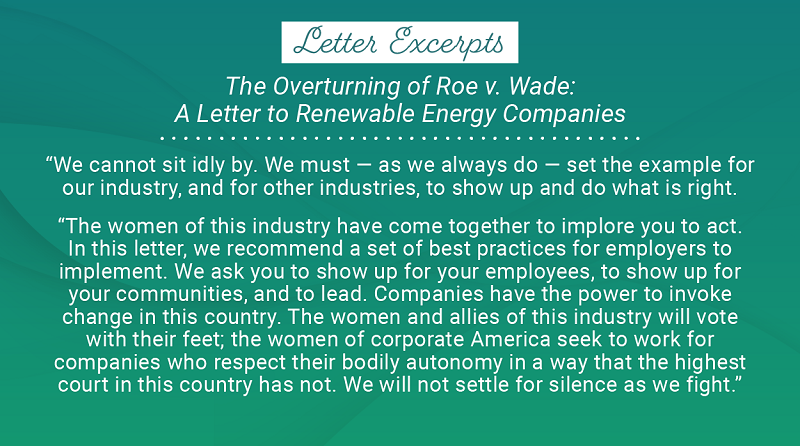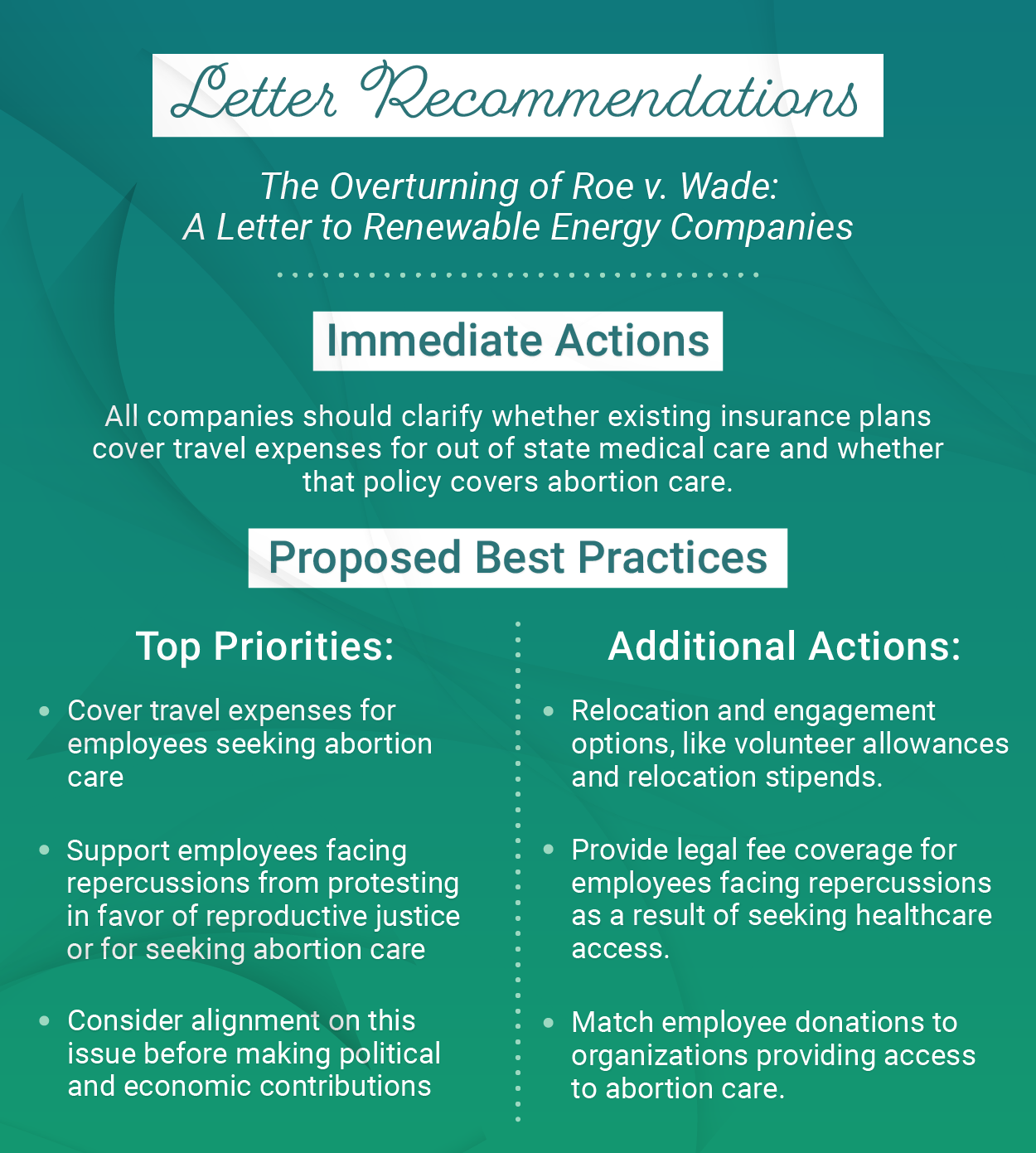Abigail Ross Hopper: Why It’s Essential that the Clean Energy Industry Stand Up for Women and Their Right to Healthcare Access

On June 24, 2022, the way we live our lives changed, but it also changed the way we do business. One of the most important parts of creating a great place to work is the benefits you offer staff. Access to healthcare, including pregnancy and abortion care, is an essential part of any benefits package.
As the clean energy industry grows and looks to hire more women* and people of color, the industry must adapt its practices and make decisions that support the people they’re trying to engage. In addition to pay, healthcare plans are one of the biggest determinants of whether someone chooses to take or stay in a job, making healthcare one of the most important parts of attracting and retaining top talent in the clean energy industry.
This becomes even more apparent as we strive for solar to reach 30% of U.S. electricity generation by 2030. If we reach this goal, the solar and storage industry will employ more than 1 million workers, but that will only happen if we invest in our workforce. Solar companies consistently report that they have difficulty hiring workers, making it even more important to retain the staff we have and remain a welcoming place for women.
To stay competitive, the solar and storage industry must weigh in on the Supreme Court decision Dobbs v. Jackson Women’s Health Organization. Major corporations and forward-thinking companies have already announced actions on this important issue, signaling that if businesses want to retain women and others impacted by this decision, they must respond accordingly.
To meet this moment, a group of women in the clean energy industry banded together to mobilize companies to stand up for their employees and take action. The group drafted an open letter to the clean energy industry explaining the importance of this issue in the solar industry and developed best practices that companies can follow to protect, support, and empower impacted workers.

The guidance offers a range of tangible actions a company can take but emphasizes that all benefits must protect employee privacy.
The letter states that the most urgent and important step companies can take is to clarify their benefit offerings so that employees can understand whether their insurance plan covers travel for healthcare procedures and whether this plan covers abortion care. The letter also explains top priority actions companies can take, like covering travel expenses for medical procedures and supporting employees that face repercussions as a result of traveling for abortion care.
In addition, the letter encourages businesses to be mindful of their political contributions and business decisions. For example, businesses can avoid hosting events in trigger states as it’s possible that an employee may not be able to get access to abortion or pregnancy care in an emergency. The decisions businesses make are more important than ever, and where a company spends money should align with company values.
The letter writers also offer a number of best practices and other ideas for supporting employees, like matching employee donations to organizations that support abortion care access, permanent relocation stipends, and covering legal fees for women that seek abortion care and face repercussions.

The Solar Energy Industries Association (SEIA) is actively working to incorporate many of these great suggestions into the Diversity, Equity, Inclusion and Justice (DEIJ) Certification Program so as many companies as possible can take action and support their employees.
The decision to support this effort is personal, but so is the choice to remain in this industry. Women are calling on their employers to stand up and fight for their rights and may choose to find other work if we fail to provide good benefits and adequate healthcare to all workers.
This is the most critical time in our industry’s history, and we need every person working in earnest to deploy clean energy and combat climate change. We’ve overcome so many roadblocks and challenges as an industry, but the solution here is simple: provide great healthcare, and we can get the right people in the room to change the world.
I hope you will join me in supporting this important endeavor.
To add your name to the list of signatories, fill out the form at the bottom of the letter.
*Note, we are using the term “women” in this piece to refer to the people impacted by the Dobbs decision, but as the authors of The Overturning of Roe v. Wade: A letter to Renewable Energy Companies rightfully point out, “this is not solely a women’s issue, and impacts the broader population of individuals who may become pregnant, including transgender and nonbinary communities

